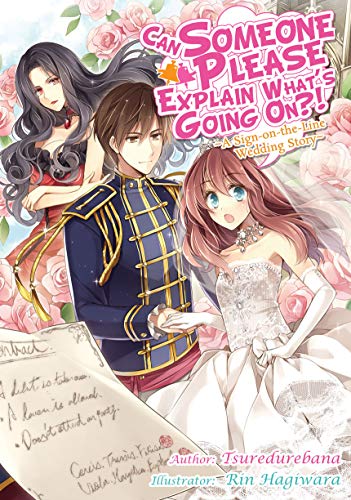By Tsuredurebana and Rin Hagiwara. Released in Japan as “Dareka Kono Joukyou wo Setsumei Shite Kudasai! ~Keiyaku Kara Hajimaru Wedding~” by ArianRose. Released in North America by J-Novel Club. Translated by Mattias Hirsch.
Something struck me as I was reading this book, particularly as our hero is away fighting a war that we never actually see and our heroine and her in-laws sit at home eating snacks and wondering how long it will be before their country triumphs: this particular story is rich people and their rich lifestyles. It does point out the arrogance of Cercis in trying to wine and dine Viola with the most expensive possible food and accessories, but this is meant to point out his naivete as a man more than his naivete as a rich man. Even Viola, who arguably goes from rags to riches as the point of the entire story, is a poor NOBLE – she is still the daughter of an earl. Most of the plot involves Viola bopping around her mansion, tending to her garden, and eating yummy food, and the closest she gets to utter shock is when she spills tea on one of the expensive dresses. It’s a fairytale.
As noted, the majority of this book sees Cersis reluctantly away from the wife he is desperately trying to woo, as the country next door has decided to battle, and they have to go over there and put them down. We get a very one-sided view of this conflict – it’s basically accepted that Cersis and company will win, the question is how long it will take, and we get no real impression of the other side at all. It’s dissatisfying, frankly, and makes everyone feel just a little bit smug. This is not helped by Cersis being in heavy-duty lovey-dovey mode throughout, so he’s writing super sappy letters to his wife and also punishing other soldiers who apparently hit on Viola without knowing who she is. It’s meant to be amusing, but it again struck me more as “I am rich and a duke, so I can do what I want.”
As you’d expect, we’re also still dealing with the fact that Viola does not realize how much Cersis is in love with her, mostly as Viola still has killer self-loathing that is starting to become a problem. Her servants are beginning to wear down a little the more Viola describes herself as plain and dull, because it just isn’t true. We do see that she’s not very good with socializing at garden parties, but that’s more as she was abandoned the moment she came in and forced to walk around on her own. Fortunately for Cersis, it does seem as if Viola is starting to develop feelings for him unconsciously. These don’t show up in her third person narration, which still seems to be filled with “gosh, we’re just a contract marriage”, but her reaction when a messenger brings what she thinks might be bad news about her husband is the clincher – she’s clearly panicked and also clearly has no idea why she’s panicked.
So overall, this is a pretty good volume in the series, but, well, even the “commoner date” Cersis takes Viola on at the start is shown to be “we use our power to take over a restaurant so that they can have their sweet date”. It’s not the most 2020 series in the world.


